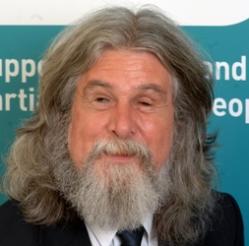As a grizzled cynic, Ian Allsop has been around long enough to have heard it all before.
It is a truth universally acknowledged that parodying Jane Austen is a good way to start a column. It is also widely accepted that civil society (or whatever it is called today – more on that later) has altered beyond measure over the last couple of decades. This is confusing, as developing new methods of measuring what it does is one of the ways in which it keeps changing.
But things I have read recently mean that one could have been forgiven for thinking that some things haven’t changed at all. I didn’t attend CFDG’s annual conference last month. However, I got a strong sense of some of the main themes from the now customary, almost instant, online reporting and felt like I had been there, on many occasions.
The opening keynote was given by RNIB chair Kevin Carey (pictured). It was one of those addresses that gets described as ‘thought-provoking’ by those who don’t necessarily agree with its conclusions but can’t quite work out how to argue against them.
It was certainly laden with juicy soundbites and punchy opinion, thus ripe to be made into media jam. Which was probably the point. Are keynote speakers chosen precisely because they are going to say something controversial, or does being selected as a keynote mean the speaker feels they are obliged to be provocative?
Whichever, Carey touched on the age-old debate about what the sector calls itself – and never are two words more likely to create a division than ‘social enterprise’.
No one term is going to suit everyone due to the disparate nature of the not-for-profit, no, third, no, voluntary, sorry, voluntary-and-community, no, charity sector. You can’t pigeonhole things conveniently into one off-the-peg definition as if it is a style of music from a particular decade any more than you can pigeonhole those who constantly try and pigeonhole things.
The counter-argument is that it doesn’t matter what the sector is called. Instead of getting bogged down in semantics just get on and change stuff.
The well-trodden paths
Elsewhere in Carey’s speech, charity pay, charities as amateur do-gooders, demonstrating impact, and practising transparency all cropped up. All legitimate issues but we’ve been there so many times before that we’ve been at the point of saying we’ve been there so many times before, many times before.
And while at least CFDG wisely avoided having a speaker in the graveyard slot after lunch, thus sparing the audience hearing someone once again try to make a joke about speaking in the graveyard slot after lunch, some of the workshops on the conference programme were straight out of the déjà vu stream.
There are partners from some of the sector’s leading charity accountancy firms who have been giving a presentation on risk management or reducing fraud since the first CFDG conference in 1872. This might leave observers to conclude that the sector is rubbish at listening and taking advice if it needs reiterating so many times.
The fact there is too much duplication by charities has been stated so many times that each additional commentator is adding nothing useful by replicating what has already been said. And there have been more examples of people getting together to discuss merger and collaboration than, well, you get the point.
This is not to criticise CFDG’s programme planners – or indeed other conference organisers – or underestimate the crucial nature of these topics. They are constantly being discussed because they need to be. It doesn’t necessarily mean the sector is failing by not moving on in these debates, as they are hard to resolve. And there is a constant change of personnel in charities, new people hearing things for the first time who aren’t as familiar with these issues as grizzled cynics who have been round the block so many times they can remember when the block wasn’t even built.
We hear that the sector is currently at a crossroads and facing a crucial period in its history. But it always seems to have been at that crossroads with a potentially bleak future. When things start to look comfortable will be when there will be less need for charities. That is inherent in the sector’s nature and defines it far more than a catchy catch-all moniker. Therefore the repetitive nature of these issues will always be present because it is part of the process of moving forward.
There is no point in trying to find a new status quo because, as people have been saying for years in different ways, the more things change the more things stay the same. All of which means that hopefully I can just rehash this column again in a year’s time.









